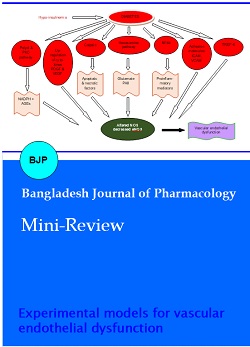Experimental models for vascular endothelial dysfunction
DOI:
https://doi.org/10.3329/bjp.v16i3.52948Keywords:
Experimental model, Mini-review, Vascular endothelial dysfunctionAbstract
Vascular endothelial dysfunction is characterized by apoptosis of endothelial cells, an imbalance between vasoconstrictory and vasodilatory substances, the imbalance between ROS and antioxidants, vascular remodeling, loss of vascular integrity which leads to an increased risk of cardiovascular complications. To date, no therapeutic intervention is available as a promising agent. This may be due to a poor understanding of the underlying mechanism involved in vascular endothelial dysfunction in the pathogenesis. Animal models sharing identical features as that of humans are paramount to understand fundamental physiology, mechanism and to explore new targets for developing therapeutic agents. Thus, it becomes mandatory to re-explore the available animal models for a better understanding of molecular pathways involving vascular endothelial dysfunction. The purpose of this paper is to review different models for vascular endothelial dysfunction to the outlook for developing new drugs to treat vascular endothelial dysfunction.
Downloads
233
259

Downloads
Published
How to Cite
Issue
Section
License
Authors who publish with this journal agree to the following terms:
- Authors retain copyright and grant the journal right of first publication with the work simultaneously licensed under a Creative Commons Attribution License that allows others to share the work with an acknowledgement of the work's authorship and initial publication in this journal.
- Authors are able to enter into separate, additional contractual arrangements for the non-exclusive distribution of the journal's published version of the work (e.g., post it to an institutional repository or publish it in a book), with an acknowledgement of its initial publication in this journal.
- Authors are permitted and encouraged to post their work online (e.g., in institutional repositories or on their website) prior to and during the submission process, as it can lead to productive exchanges, as well as earlier and greater citation of published work (See The Effect of Open Access).
